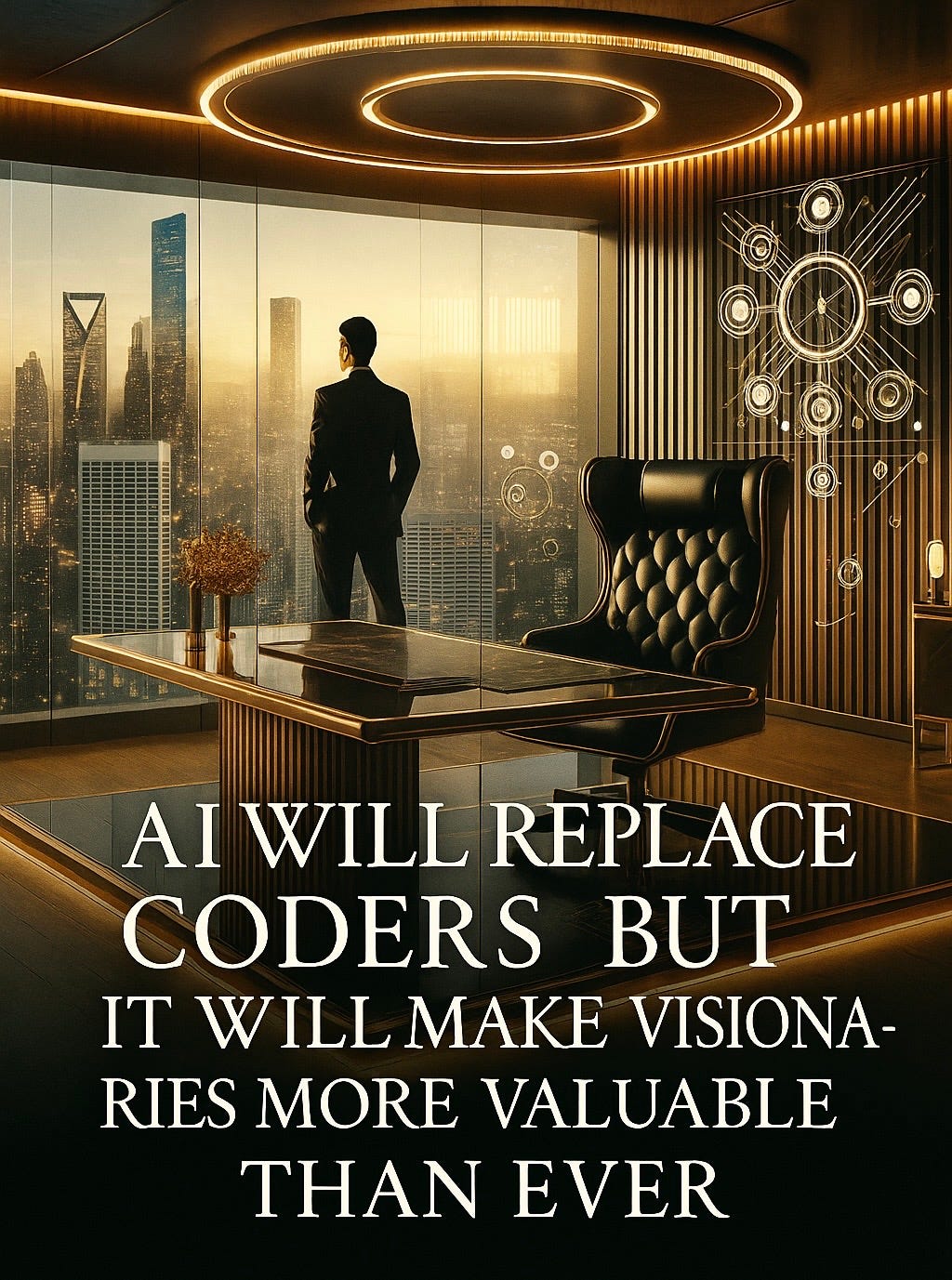AI Will Replace Coders — But It Will Make Visionaries More Valuable Than Ever
Over the past two decades, I’ve had the privilege of building companies, collaborating with engineers, and advising leaders across industries as they navigate the constant evolution of technology. I've seen many waves of innovation—cloud computing, mobile apps, digital payments, blockchain. But what we are witnessing today with artificial intelligence is not just another wave; it’s a transformation that rewrites the rules of business, talent, and value creation itself.
Artificial intelligence is rapidly automating the tasks that once defined the software development profession. It is now capable of generating code, designing interfaces, writing documentation, debugging applications, and even deploying full systems—all with remarkable speed and accuracy.
This change is real. It is accelerating. And for many coders, it will be deeply disruptive.
But within this disruption lies a tremendous opportunity—for those with the foresight to adapt, and for those who understand that the future will reward not just technical skill, but imagination, leadership, and strategic thinking.
The End of Code as We Know It
Tools like GitHub Copilot, OpenAI Codex, and various generative platforms can now write functional applications in minutes. Developers who once spent days building login systems, payment integrations, or frontend views are finding that these tasks can be completed by AI in a fraction of the time.
This is not speculative. It is already reshaping how startups are built, how software is maintained, and how companies allocate engineering budgets.
For developers whose primary strength is the ability to write clean, correct code—this trend poses a direct challenge. Routine, repetitive development work is becoming commoditized. And when something becomes commoditized, its market value decreases.
But that does not mean the role of the developer is disappearing. It means the role is evolving—and with that evolution comes the need for a new kind of developer, and a new kind of leader.
What AI Can’t Replace
Artificial intelligence excels at executing instructions, analyzing patterns, and automating tasks. But it cannot yet originate a compelling vision. It does not understand human emotion, cultural nuance, market dynamics, or ethics. It cannot craft a product strategy rooted in lived experience or foresee how a new platform might reshape user behavior.
The ability to write code is being absorbed by machines. The ability to see the future, connect disparate ideas, and lead people through change is becoming the rare and valuable skill.
This is where developers—and professionals across industries—must now shift their focus: from executors to orchestrators, from technicians to strategists.
The New Role of the Developer
In the AI-augmented era, technical professionals must rise to new expectations. The most valuable developers will be those who:
Understand how to collaborate with AI, using it not as a shortcut, but as an extension of their thinking
Possess product and UX sensibilities, ensuring that what is built truly serves the user
Think in systems and architecture, not just lines of code
Have a grasp of business models, monetization, and growth strategy
Lead teams, communicate effectively, and build consensus around bold ideas
Simply put, the developer of the future must be as much a thinker as a builder.
Guidance for Business Leaders
For executives and entrepreneurs, this moment requires an equally profound shift in mindset. The key question is no longer “How many engineers do we need?” but rather, “How can we build a team that can turn AI into competitive advantage?”
You must look for people who can design around AI, deploy it wisely, and ensure it enhances your company’s strategic goals—not just your short-term productivity.
Don’t hire just for technical execution. Hire people who can make sense of the noise, translate technological shifts into opportunity, and help your organization stay ahead as industries are redefined.
A Personal Reflection
I’ve always believed that technology, at its best, is a tool to amplify human potential. But amplification can go both ways—it can elevate mediocrity just as easily as it can elevate genius. That’s why we must become more intentional about how-we use these tools, and who is guiding their development and application.
The age of memorizing frameworks and syntax for job security is over. The professionals who will thrive in this new era will be those who constantly learn, who lead with curiosity, and who never lose their ability to see what others miss.
They will not compete with AI—they will lead it.
We are entering a world where the ability to imagine, synthesize, and execute bold ideas will far outweigh the ability to write code by hand. In this new economy, your creativity, adaptability, and judgment are your most powerful assets.
Let us not resist this transformation. Let us lead it—with clarity, with courage, and with a relentless focus on solving real problems.
“The future belongs to those who can build not just with their hands, but with their minds”
Advisory Services
If you are an executive, founder, or team leader navigating these changes, We offer strategic advisory services to:
Help organizations implement next-generation technologies with precision and purpose
Identify friction points and mitigate operational and talent risks
Guide leadership teams through transformation roadmaps that create competitive advantage
Build a culture of innovation that is resilient, forward-thinking, and agile
To explore working together, please feel free to reach out directly. We work closely with leadership teams internationally in seven languages across sectors to help shape the future—intelligently and intentionally.





